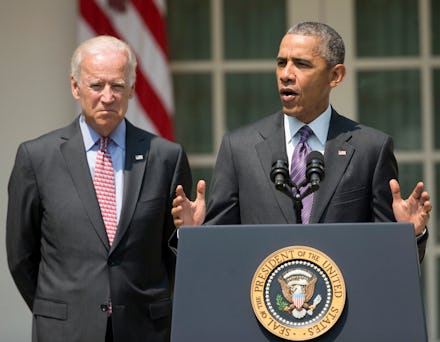President Obama Just Announced a Deal to Open an American Embassy in Cuba

President Barack Obama announced Wednesday that the U.S. has agreed to restore full diplomatic relations with Cuba after a schism lasting more than 54 years.
As part of the agreement, the countries will reopen embassies in Washington, D.C., and Havana, with Secretary of State John Kerry scheduled to travel to the Cuban capital later this month.
"This is not merely symbolic," Obama said in a live statement from the Rose Garden of the White House. "With this change, we will be able to substantially increase our contacts with the Cuban people, we'll have more personnel at our embassy and our diplomats will have the ability to engage more broadly across the island."
The new agreement is the product of more than six months of negotiations following the administration's surprise decision in December to begin the process of loosening decades-old restrictions on travel and commerce. With a nudge from Pope Francis, back-channel discussions were first authorized by Obama in spring 2013. Canada and the Vatican both played to host to secret, high-level talks.
Despite the progress, broad and longstanding economic sanctions will remain in place. Congressional Republicans, many with strong ties to the conservative anti-Castro Cuban-American community, are unlikely to follow the White House's lead. Many have been vocal critics of Obama's decision to initiate the thaw.
Sen. Marco Rubio (R-Fla.), a candidate for president, has promised to block any attempt by the administration to send an ambassador to Cuba. In December, he said Obama was "not just naive, but willfully ignorant of the way the world truly works."
Another 2016 contender, former Florida Gov. Jeb Bush, released a statement late Tuesday morning condemning the new agreement, saying it "further [legitimizes] the brutal Castro regime" and fails to "advance the cause of human rights and freedom for the Cuban people."
Anticipating that line of attack, Obama argued during his Rose Garden speech that "engagement," rather than further estrangement, would be "the best way to advance our interests and support human rights."
What it means right now
Momentum. With a Republican-controlled Congress unwilling to engage on the issue, Cuba is Obama and Kerry's game. In May, the U.S. removed the government in Havana from its list of state sponsors of terrorism for the first time since 1982, a move that opened up financial channels between the two countries.
On Tuesday, Cubans applying for visas flocked to the location of the U.S. diplomatic mission in the capital.
What it means for you
Tourist travel remains illegal, but the State Department now has greater latitude to grant permits to musicians and artists to visit the country for cultural events, like concerts or exhibitions and sporting clinics. Businesses, including telecommunication providers, have the ability schedule meetings with Cuban companies to begin negotiations on potentially lucrative partnerships. Americans on the island are also able to use their credit and debit cards, with the U.S. rolling back its consumer banking ban.
In December, senior administration officials confirmed that the tight cap on "remittances," or the money U.S. nationals are legally permitted to send to family in Cuba, would get a 400% bump, from $500 to $2,000 every three months. You can also expect to begin seeing those celebrated Cuban cigars make a glorious return to the states, as returning visitors will be allowed to carry $100 of tobacco and alcohol back into the country.
These are the letters exchanged by President Obama and Cuban President Raul Castro, via the White House:
Obama to Castro:
Castro to Obama:
You can watch Obama's full statement below: